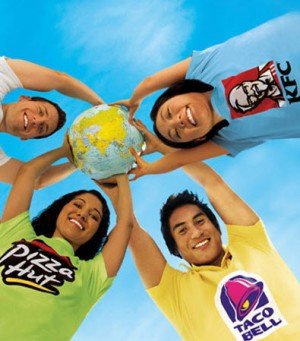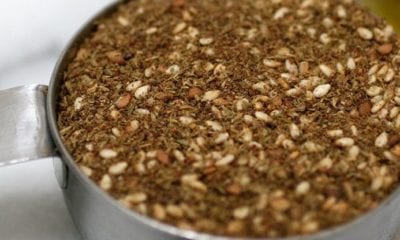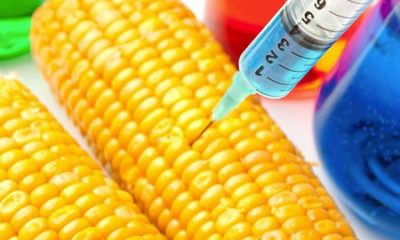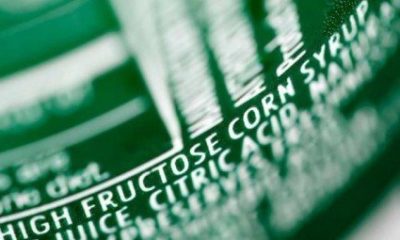Vigilant Reports
Irrational Consumerism (or The Few Companies That Feed the World)
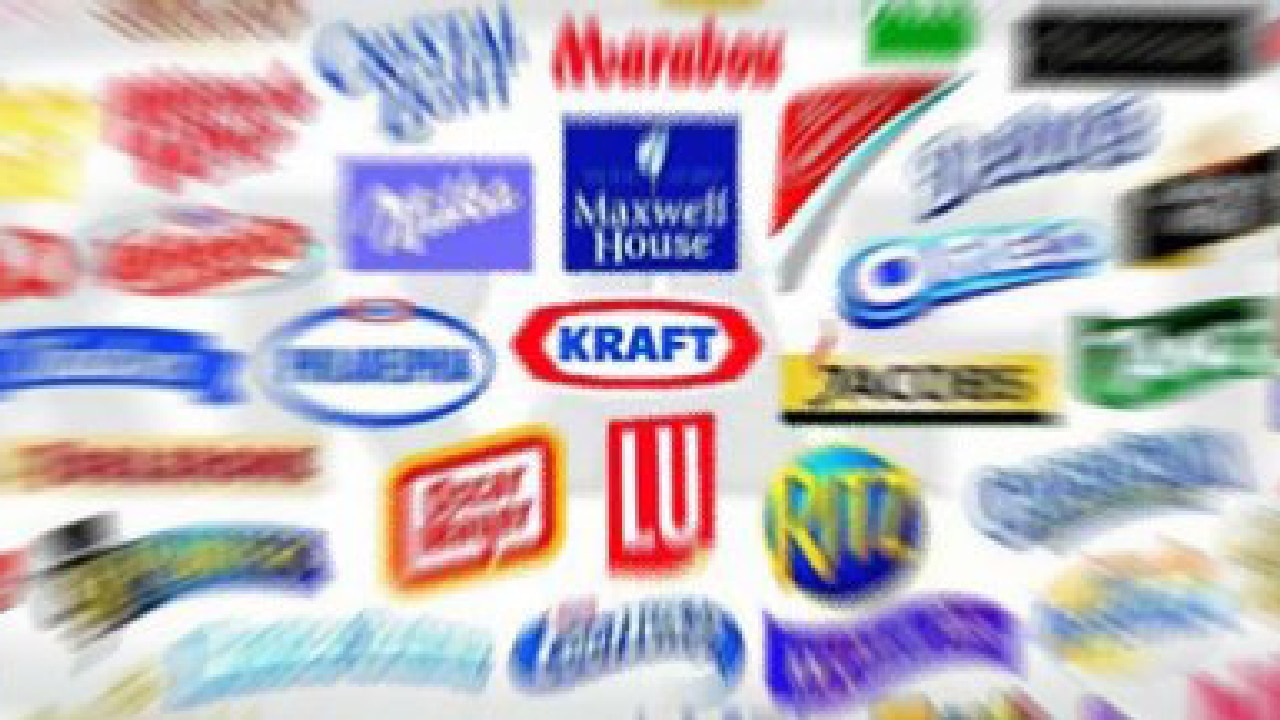
Not many people realize that most of the processed foods available on the market, whether they be in groceries or fast-food chains, all come from the same few companies. Even less people realize that these companies are major actors in elite organizations who decide health, social and economic policies around the world. We’ll look at the big three companies who feed the world, their many brands and the tactics they undertake to make people crave their products.
If one were to carefully study the labels on packaged products in an average grocery store, one would probably notice that the same company names appear repeatedly: Nestlé, Kraft, General Mills and a few others. Many brands offering good ol’ fashioned homemade or all-natural/organic foods are nothing more than subsidiaries of these few world-wide mega-companies. The major difference between the main brand and the subsidiaries is packaging and advertising, which are targeted to reach different markets. In order to preserve the carefully crafted image surrounding a product, connections to the mother company are often conveniently hidden. Imagine an advertisement for bottled water going like this: “Drink pure, clear, refreshing Aquafina water, bottled with care from remote natural sources in the Himalayas … BROUGHT TO YOU BY PEPSICO, THE MAKER OF TACO BELL AND CHEETOS MIGHTY ZINGERS!” That would probably spoil the healthy, natural image they are trying to create for the product.
That is the reason marketing and branding are the most vital part of the food industry. Each product must live in its own “world”, separate from its mother company and similar products. Advertising is so powerful that two similar brands of cereal, made from the same basic ingredients, can be targeted to entirely different markets. For example, are Special K and Rice Krispies so different? From a strictly rational viewpoint, these products are nearly identical in shape, taste and ingredients. From an irrational (marketing) viewpoint however, they are in two different worlds. Advertisements for Rice Krispies revolve around colorful cartoon characters and played during Saturday morning kids’ shows while Special K tends to show fit women doing yoga (or on their way to or from yoga). Rice Krispies boxes have games and toy giveaways, while Special K‘s box gives access to a “weight loss challenge” website. All of this is smoke and mirrors, however, because at the end of the line, whether you choose one, the other or pretty much any other cereal in the grocery store, you’re eating the same thing and your money ends up at the same place.
The processed-food industry can be considered a true oligopoly. Together, the three leading food companies, Nestle, Kraft Foods and PepsiCo, achieve a dominant proportion of global processed-food sales. In fact, these three companies are often used as an example of “Rule of Three” in business schools, since they are a real-life example of a market being dominated by three gigantic actors. Their position as worldwide food providers has made these conglomerates extremely powerful, and they are represented in most elite organizations such as the Council of Foreign Relations. This not only allows them to provide their preferred policies on nutrition and health issues across the globe, but on economic, political and social issues as well. Such prominence also allows these companies to ensure their continued market dominance, through policy-making, access to insider information and the intimidation of potential competitors. If considered objectively, the oligopoly of major companies like these are a direct threat to free market theories.
Today, if a small food company were to create a new revolutionary product, it would find it difficult to obtain distribution without giving up its rights to one these conglomerates. In addition to dominating the shelves, the Big Three control most of the worldwide channels of distribution, to the point that up-and-coming companies cannot reach the consumers without dealing with them. The only way small business owners can avoid years of struggle and rejection to obtain shelf-space in supermarkets is to strike a licensing deal with one of the giants, where the owner cedes the ownership and the rights to the product in exchange for royalty checks (which are usually a small percentage of the sales). Each licensing deal consolidates these companies’ position and eliminates threats from any potential competitor who creates game-changing products.
Here are the top three companies and a summary list of their multiple brands:
1- Nestlé
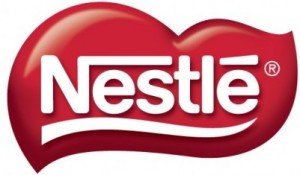
Nestlé is the world’s largest food company. It has 6,000 brands, with a wide range of products across a number of markets including coffee, bottled water and other beverages, chocolate, ice cream, infant foods, performance and healthcare nutrition, seasonings, frozen and refrigerated foods, confectioneries and pet food. In 2009, consolidated sales were close to $120 billion USD and investments in research and development were $2.24 billion USD. The chairman of the company, Mr. Brabeck-Letmathe, is on the Board of Directors of Credit Suisse Group, L’Oréal and ExxonMobil. He is also a member of ERT (European Round Table of Industrialists) and a member of the Foundation Board of the World Economic Forum (an important actor in the push for a world government). Products sold by Nestlé include:
Cereals
Cinnamon Toast Crunch
Cheerios (outside US, Canada and Australia)
Cini Minis
Honey Nut Cheerios (outside US, Canada and Australia)
Oat Cheerios
Cookie Crisp
Golden Grahams
Honey Stars
Koko Krunch
Milo Cereals
Nestlé Corn Flakes
Nesquik
Shreddies
Shredded Wheat
Clusters
Trix
Yogurt
Munch Bunch
Ski
Coffee
Bonka
Nescafé
Nespresso (here are some of their best-selling models)
Partner’s Blend
Ricoffy
Ristretto
Ricoré
Sical
Tofa
Taster’s Choice
Zoégas
Shrameet
Water
Aberfoyle
Aqua D’Or
Aqua Pod
Acqua Panna
Al Manhal
Aquapod
Arrowhead
Buxton
Contrex
Deer Park
Hépar
Ice Mountain
Henniez
Korpi
Levissima
Nestlé Aquarel
Nestlé Vera
Ozarka
Perrier
Poland Spring
Powwow
Minere
Pure Life/Pureza Vital
Quézac
San Pellegrino
San Bernardo
Viladrau
Vittel
Zephyrhills
Other drinks
Nestea (Joint venture with Coca-Cola, Beverage Partners Worldwide)
Enviga (Joint venture with Coca-Cola, Beverage Partners Worldwide)
Milo
Carnation
Caro
Nesquik
Libby’s
Growers Direct Organic Fruit Juices
Good Host
Juicy Juice
Ski up and go
Shelf-stable products
Bear Brand
Carnation
Christie
Coffee-Mate
Dancow
Gloria
Klim
La Lechera
Milkmaid
Nespray
Nestlé
Nesvita
Nestlé Omega Plus
Nido
Ninho
Svelty
Emswiss
Milo
Ice cream
Camy
Dreyer’s
Edy’s
Frisco
Häagen-Dazs (North America and the United Kingdom)
Hjem-IS (Denmark & Norway)
Maxibon
Motta
Mivvi
Nestlé
Nestlé Drumstick
Oreo (Canada)
Peters (Australia)
Push-Up
Schöller
Skinny Cow
Infant foods
Alete
Alfare
Beba
Cérélac
FM 85
Gerber (the world’s largest baby food company)
Good Start
Guigoz
Lactogen
Nan
NAN HA
NanSoy
Neslac
Nestlé
Nestogen
Nido
PreNan
Performance nutrition
Musashi
Neston
Nesvita
PowerBar
Pria
Supligen
Healthcare/nutrition
Boost
Carnation Instant Breakfast
Nutren
Peptamen
Glytrol
Crucial
Impact
Isosource
Fibersource
Diabetisource
Compleat
Optifast
Resource
Seasonings
Buitoni
Maggi
Carpathia
CHEF
Thomy
Winiary
Frozen foods
Stouffer’s
Lean Cuisine
Buitoni
Hot Pockets
Lean Pockets
Papa Guiseppi
Tombstone Pizza
Jack’s Pizza
DiGiorno Pizza
California Pizza Kitchen Frozen
Chocolate, confectioneries and baked goods
100 Grand Bar
Aero
After Eight
Allens
Animal Bar
Baby Ruth
Bertie Beetle (Australia)
Big Turk (Canada)
Black Magic
Boci (Hungary)
Blue Riband
Bono(Brazil)
Breakaway
Butterfinger
Butterfinger BB’s
Butterfinger Crisp
Bon Pari (Czech Republic, Poland and Hungary)
Cailler
Caramac
Carlos V
Chips Ahoy! (Canada)
Coffee Crisp
Chunky
Drifter
Frigor
Galak/Milkybar
Goobers
Heaven
Hercules Bars (with Disney)
Icebreakers
Kit Kat (Hershey’s in the US)
Lion
Matchmakers
Milky Bar
Mirage
Joff
Munchies
Nestlé Alpine White
Nestlé with Almonds
Nestlé Crunch
Nestlé Crunch Crisp
Nestlé Crunch with Caramel
Nestlé Crunch with Peanuts
Nestlé Crunch Pieces
Nestlé Crunch White
Nestlé Milk Chocolate
Nestlé Princessa
Nestlé Wonder Ball
Nips
Nuts (Europe)
Oh Henry (except US)
Peppermint Crisp
Perugina Baci
Polo
Quality Street
Raisinets
Rolo (Hershey’s in the US)
Rowntrees
Fruit Pastilles
Jelly Tots
Pick & Mix
Randoms
Fruit Gums
Tooty Frooties
Juicy Jellies
Snowcaps
Smarties
Texan Bar
Toffee Crisp
Toll House cookies
Turtles
Walnut Whip
Violet Crumble
Yorkie
XXX mints
Petcare
Alpo
Beneful
Cat Chow
Dog Chow
Fancy Feast
Felix
Friskies
Go Cat
Butchers
Bakers
Winalot
Gourmet
Mighty Dog
Mon Petit
ONE
Pro Plan
Purina
Tidy Cats
Controversy
Nestlé has faced ongoing resistance around the world for its promotion of breast milk substitutes (infant formula), especially in third world countries. According to campaigners, Nestlé contributes to the unnecessary suffering and even deaths of babies, largely among the poor.
Advocacy groups and charities have accused Nestlé of unethical methods of promoting infant formula over breast milk to poor mothers in developing countries. For example, IBFAN claim that Nestlé distributes free formula samples to hospitals and maternity wards; after leaving the hospital, the formula is no longer free, but because the supplementation has interfered with lactation, the family must continue to buy the formula. IBFAN also allege that Nestlé uses “humanitarian aid” to create markets, does not label its products in a language appropriate to the countries where they are sold, and offers gifts and sponsorship to influence health workers to promote its products.Nestlé denies these allegations.
2- Kraft Foods
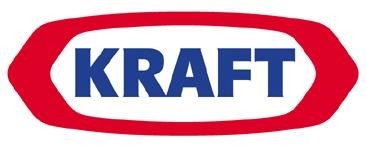
A subsidiary of Philip Morris (the maker of Marlboro cigarettes). Kraft Foods is the largest confectionery, food, and beverage corporation headquartered in the United States. It markets many brands in more than 155 countries; eleven of its worldwide brands each earn more than $1 billion annually. Like Nestle, Kraft has consolidated its status in the food oligarchy by buying gigantic brands such as Nabisco (Oreos, Chips Ahoy, Fig Newtons, Ritz, etc.) and Cadbury (Ferrero Rocher, Dairy Milk, Caramilk, etc.).
Kraft’s CEO Irene Blecker Rosenfeld was rated the “2nd most powerful woman in the world” by Forbes. Not surprising since most of the world consumes Kraft foods. Before joining Kraft, Rosenfeld was Chairman and Chief Executive Officer of Frito-Lay, a division of PepsiCo (another of the “Big Three”). Kraft’s brands include:
Toblerone chocolate bars
A1 Steak Sauce
Ali Coffee
Arrowroot biscuits
Back to Nature
Baker’s (chocolate)
Balance Bar
Better Cheddars
Boca Burger
Bonox
Breakstone’s
BullsEye Barbecue Sauce
Café HAG
California Pizza Kitchen (grocery store items)
Calumet Baking Powder
Cameo (biscuits)
Capri Sun (juice drink)
Carte Noire
Cheesybite
Cheese Nips
Cheez Whiz
Chicken in a Biskit
Chips Ahoy! (cookies)
Christie (Canadian division of Nabisco)
Claussen (pickles)
Clight
Club Social (crackers)
Cool Whip (non-dairy whipped cream)
CornNuts (snack food)
Côte d’Or (Belgium)
Country Time (powdered drink mix)
Cracker Barrel
Crystal Light
Dairylea (Europe)
Delissio (Canada)
DiGiorno (pizza)
Easy Cheese
Fig Newtons
Fudgee-O (Canada)
General Foods International
Grape-Nuts (breakfast cereal)
Grey Poupon (mustard)
Handi-Snacks
Honey Maid
In-A-Biskit (Australia)
Jack’s Pizza
Jacobs (Europe)
Jell-O (gelatin dessert)
Jet-Puffed Marshmallows
Kenco (United Kingdom)
Knox (gelatin)
Knudsen (dairy products)
Kool-Aid (flavored drink mix)
Kraft BBQ Sauce
Kraft Caramels
Kraft Macaroni and Cheese
Kraft Dinner (Canada)
Kraft Easymac
Kraft Mayo
Kraft Bagelfuls
Kraft Peanut Butter (Canada)
Kraft Singles (pasteurized prepared cheese product)
Kraft Sandwich Spread
Lefèvre-Utile
Lunchables
Maxwell House (coffee)
Miracle Whip (salad dressing spread)
Nabisco
Nabob (coffee) (Canada)
Naked Drinks
Nilla
Nutter Butter
Onko (coffee)
Oreo (cookie)
Oscar Mayer
Grated Parmesan cheese
Philadelphia cream cheese
Pigrolac
Planters
Polly-O (cheese)
Premium (a Nabisco brand of saltine crackers)
Pretzels
P’tit Québec
Prince Polo
Pure Kraft Salad Dressings
Ritz
Royal baking powder
Seven Seas (salad dressings)
Sanka (decaffeinated coffee)
Shake ‘n Bake
Simmenthal (canned meat)
Snackabouts
SnackWells
South Beach Living
Starbucks (grocery store items)
Stove Top stuffing
Suchard
Taco Bell (grocery store items)
Tang
Tassimo (single-serve coffee machines using pods branded as T-Discs)
PepsiCo
PepsiCo Incorporated is a global Fortune 500 corporation headquartered in Purchase, Harrison, New York, with interests in the manufacturing, marketing and distribution of beverages, grain-based snack foods and other products. If you hadn’t guessed it, its main product is Pepsi Cola, but soda pop is not the company’s only product. In fact, a teenager with the munchies could easily leave a convenience store with three or four PepsiCo products without realizing it (or caring).
PepsiCo is a “Premium” member of the Council of Foreign Relation and of the Brookings institute, two of the most important organizations for the world’s elite (as seen in the article Naming Names: Your Real Government). The chairman and CEO of PepsiCo, Indra Nooyi, is part of the World Economic Forum. Within these organizations, executives from PepsiCo and other mega-corporations like Sony (the largest label in the music industry), Nike (the largest shoe seller in the world), Rockefeller Group International, and Lockheed Martin (the largest defense company in the world), work alongside various heads of state (including past US presidents), policy-makers (such as current US Secretary of State Hilary Rodham Clinton) and image makers (like Tom Brokaw and George Clooney), to develop political, social and economic opinions and recommendations affecting entire countries. The policies favored by these organizations are collectively steering the world towards a unified world government and a single world currency, in what is often referred as a “New World Order”.
PepsiCo brands include:
Drinks:
AMP
Brisk
Mountain Dew
Ocean Spray
Mist
Aquafina
Lipton Ice Tea
MUG
Pepsi
Sobe
Gatorade
Tropicana
No Fear Energy Drink
Propel Enhanced Water
Starbucks (retail products)
Food
Lay’s
Doritos
Tostitos
Cheetos
Fritos
Sun Chips
Baked!
Frito Lay Dips
Baken-Ets
Chester’s Puffcorn
Cracker Jack
El Isleno Plantain Chips
Frti-Lay Peanuts
Funyuns
Gamesa
Grandma’s
Matador
Maui Style Potato Chips
Miss Vickie’s
Munchies
Munchos
Natural
Nut Harvest
Quaker
Rold Gold
Ruffles
Sabritones
Santitas
Smartfood
Spitz
Stacy’s
Yep, even the good ol’ trustworthy Quaker guy is part of PepsiCo.
The Spin-Off Company
PepsiCo also feeds millions daily through its spin-off company, Yum!, which owns restaurant chains including Pizza Hut, Taco Bell, KFC,Hot ‘n Now,East Side Mario’s,D’Angelo Sandwich Shops,Chevys Fresh Mex, California Pizza Kitchen and Stolichnaya.
Many of the products listed above have existed for decades, some for over a century. What is the secret of such enduring success? First, the recipe has to be just right. As mentioned above, Nestlé spent more than $2 billion dollars in 2009 alone for research and development, which is mostly used to pay people in lab coats to create the most appealing, taste-bud satisfying, addicting and, of course, cost-effective products possible. The addictive properties of salt, fat, sugar and other chemicals are well known to the $2 billion-per-year researchers. Processed foods contain a carefully calculated mix of chemicals and additives that send “satisfying” signals to the brain, which the brain then continues to seek out in the form of cravings.
However, there are countless companies selling similar products. So in order to keep consumers coming back to their specific brand, corporations invest billions of dollars in the second secret of success: “brand loyalty” achieved through marketing and advertising.
In Conclusion
Why should one care about which company sells which product? Primarily, it is a question of health. Almost all of the hundreds of products cited in this article contain toxic ingredients, from excessive amounts of saturated fat to additives like MSG, High Fructose Corn Syrup (HFCS), mercury and/or aspartame. These substances, and many more like them, are poisonous to the body, the nervous system and the brain (as discussed in the article Dumbing Down Society: Food, Beverages and Meds). Processed foods are making the entire world fatter, sicker and dumber, even though only a few companies produce them. It is vital to know and recognize them … so you can avoid them. It is also important to recognize the basic marketing tactics that are being used to push consumers to buy processed foods.
The issue is much larger than individual health, however. To be aware of the companies selling your food is to be aware of important actors of the world elite. As the saying goes “control the food and you control the people”. If you believe it is important to know the truth about the world’s power structure, it is fundamental to know about these companies and understand their extensive reach throughout all areas of our global society. They might “only” sell food, but their power and position gives these conglomerates an active role in world governance, including economy, politics, law-making and even the military (who do you think supplies military mess halls?). The Big Three and globally dominant corporations like them are part of policy-setting “think tank” organizations such as the Council on Foreign Relations and the Bilderberg Group, which serve as the true motors behind global change. Should PepsiCo have a say in the invasion of a country such as Iran? Well, it does. And every time you buy a Pepsi or a bag of Doritos or jug of Tropicana, you are helping them become richer and more powerful. Luckily, however, there is an easy way to stop supporting these companies: Simply replace the processed products you buy from these companies with fresh foods bought from local businesses. You’ll improve your health and your local economy, but most importantly, you’ll also become the elite’s worst nightmare: a rational consumer.
- Behold a pale horse! – Horses injured four in six-mile rampage after builder 'dropped concrete'
- What?! A Rather Interesting Shein Kids Sponsored Ad on Instagram
- Illinois Public Library and Elementary School to host 'pronoun' seminar for children considering cross-dressing, sex change
- Storyteller Fountain – Birmingham, Alabama
- Patrick O'Carroll- Chlorine in Drinking Water and Refined Salt Causes Cardiovascular Disease
- Another movie about elite sacrifice.
- Pfizer acquired Seagen, a global biotechnology company that "discovers, develops and commercializes transformative cancer medicines".
Get an e-mail notification as soon as a new article is published on The Vigilant Citizen.
-
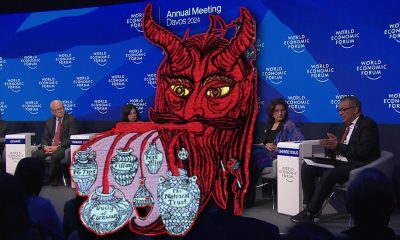
 Latest News3 months ago
Latest News3 months agoThe Top 6 Most Deranged Moments of the WEF’s 2024 Davos Meeting
-

 Vigilant Reports2 months ago
Vigilant Reports2 months agoSuper Bowl 2024 Was a Circus Involving a Clown Wearing an Inverted Cross
-

 Movies and TV3 months ago
Movies and TV3 months ago2024 Grammys: It Had To Be All About Taylor Swift. It Just Had To.
-

 Movies and TV1 month ago
Movies and TV1 month agoThere’s Something Terribly Wrong With “Poor Things”
-

 Pics of the Month2 months ago
Pics of the Month2 months agoSymbolic Pics of the Month 02/24
-

 Music Business1 month ago
Music Business1 month agoThe Blatant Luciferian Symbolism in Justin Timberlake’s “No Angels”
-

 Music Business2 months ago
Music Business2 months agoPoppy’s “V.A.N”: One of the Most Blatant MKULTRA Videos Ever Made
-

 Pics of the Month3 weeks ago
Pics of the Month3 weeks agoSymbolic Pics of the Month 04/24


